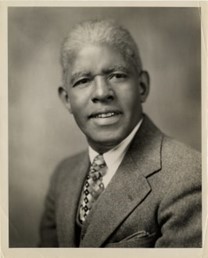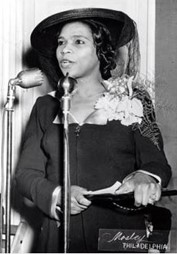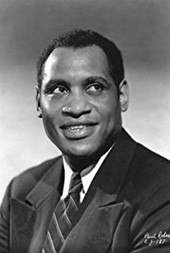
Spiritual Art Songs: Harry Thacker Burleigh (Continued)
Three noted singers who attracted to this new form of composition were the lyric tenor Roland Hayes (1887-1997), the operatic contralto Marian Anderson (1897-1993), and the concert artist and actor Paul Robeson (1898-1976). All three championed this style of work on the concert stage to wide acclaim.
| ROLAND HAYES (1887-1997) |
MARIAN ANDERSON (1897-1993) |
PAUL ROBESON (1854-1914) |
|---|---|---|
|
|
|
|
| Lyric Tenor and Composer | Operatic Contralto | Bass Baritone |
| Interview with Jackson Caesar Hear de Lambs (Negro Spiritual) |
Marian Anderson sings three songs (1951) Marian Anderson: The Most Modest Trailblazer Awakening: Marian Anderson Segment |
Deep River |
Click on the links in the boxes above to listen to their performances. Of the three singers mentioned, it was Marian Anderson who in her early career sang Burleigh's 1917 solo arrangement of "Deep River" (Kimball 2006, 250).
Deep River, which Burleigh states is based on an old "negro melody," which first appeared in 1875 in J.B.T Marsh's The Story of the [Fisk] Jubilee Singers: With Their Songs (Shirley 1997, 497), pays tribute to the "old guard(s)" as mentioned by Banfield earlier in the lesson. Further along in this "stream of a continuum," other composers would take Burleigh's lead and write compositions based on the use of the early spirituals.
Active Listening: Listen to Fisk Jubilee singers' a cappella performance of " Deep River ."
Listen to Marian Anderson's 1924 art song performance of " Deep River arranged for orchestra and voice. Watch below to listen to a piano-vocal version. Notice that the work, which consists of four lines of text, is cast into an ABA' form.

Traditional: Deep River (Arr. Coleridge-Taylor, Kanneh-Mason)







